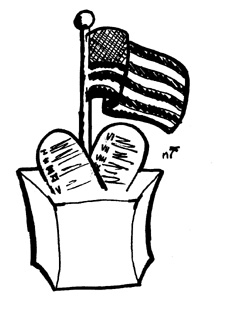Opinion: Purging religion

Matt Yurkanin
October 14, 2004
For the first time since 1980, the Supreme Court has decided to address the legality of displaying the Ten Commandments on public property. Apparently, in the wake of several competing opinions handed down by lower courts, the high court of the land has agreed to establish precedent, selecting two different Ten Commandments cases for the current term.
Whether the Court rules in favor of the display is only a small component of the broader issue regarding the role of religion in this country. To many people, the Ten Commandments decision is a no-brainer. They’ll point to the Constitution, invoke the phrase “separation of church and state” and the case will be settled in their minds. The problem is, “separation of church and state” is nowhere to be found in the Constitution.
The phrase, which was coined by Jefferson, was not meant to keep religion out of the public sphere (as most liberals interpret it to mean.) It was simply a one-way protection for the churches – not from them. Jefferson first used the phrase in a letter to Baptists to assure them there would be no state-sponsored church after rumors were circulating that Congregationalism, another denomination, was to become the national religion. Jefferson was simply looking to protect the people’s right to practice their religion from interference by the state.
Whether one likes it or not, the Ten Commandments and the Old and New Testaments are as much a part of our nation’s founding as is the Constitution and the Declaration of Independence. For example, the book of Isaiah states, “For the Lord is our judge, the Lord is our lawgiver, the Lord is our king.” From this, the three branches of government were derived – with the executive enforcing laws, the legislative making laws and the judiciary interpreting laws. To deny the impact of religion in the creation of our democratic system is an account of revisionist history.
In addition to its historical importance, the ethical framework of this country was founded on Judeo-Christian ethics and values – and what better source than the Ten Commandments? Now this isn’t to say that other religious groups can’t observe their faith, but the central tenets of these religions were not relevant to the founding of the United States. That is the answer to the “why isn’t the Quran displayed?” objection to the Ten Commandments.
Get The Daily Illini in your inbox!
In permitting the Ten Commandments to be displayed, the government is not sponsoring or advocating one particular religion. All religions can legally practice under the protections of the Constitution, so long as their practices are peaceful. No religions are being banned and there is no state church, so why claim religious rights are being violated by a few displays of the Ten Commandments that one has the right not to view?
The answer is rooted in the liberal push -not for religious freedom or equality – but for secularism. To secularists, all public references to God should be removed. Those who believe the phrase “under God” should be removed from the Pledge of Allegiance fit this profile perfectly. Secularists have every right to “protect” those who do not believe in God, but to have all references removed is to undercut the religious freedoms of everybody else. Remember, the Constitution protects people’s freedom of religion, not freedom from religion.
The Ten Commandments have an extremely important impact historically, religiously and morally. Yet, for the secularists who misinterpret the Constitution and look to build a complete barrier between religion and government, the removal of these monuments is only the first step in a series of moves to delegitamize the role religion has played in our great nation. The Supreme Court must stand firm against this tyranny of the minority and ensure that decency prevails – for without God, morality is just a personal preference.
Elie Dvorin is a junior in LAS. His column runs Thursday. He can be reached at [email protected].






